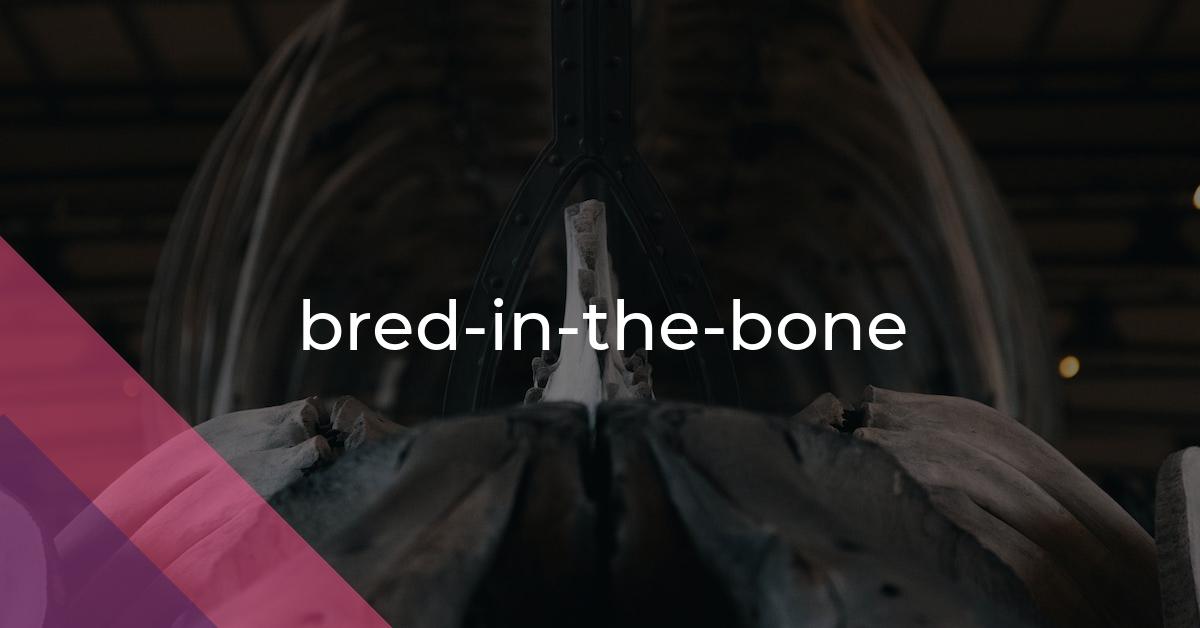bred-in-the-bone: Idiom Meaning and Origin
What does ‘bred-in-the-bone’ mean?
The idiom "bred-in-the-bone" refers to a deeply ingrained characteristic or behavior that is inherent and difficult to change due to long-standing habits or upbringing.

Idiom Explorer
The idiom "in character" means acting or behaving in a way that is consistent with one's typical behavior or personality.
The idiom "hard as nails" means to be strong, tough, or unbreakable in character, attitude, or physical strength.
The idiom "hard-and-fast" means having strict and inflexible rules or principles that must be followed without exception.
The idiom "fruit of one's loins" is a metaphor that refers to a person's biological offspring or children.
The idiom "dyed-in-the-wool" means firmly and completely holding a particular belief or opinion. It refers to something that is deeply ingrained and unlikely to change.
The idiom "dig one's heels in" means to refuse to change one's mind or course of action despite pressure or opposition.
The idiom "deep down" refers to one's true or hidden feelings, thoughts, or qualities. It suggests that there is an inner core, often different from one's external appearance, that truly represents who a person is.
The idiom *creature of habit* refers to a person who consistently follows the same routines or behaviors, often without considering alternatives. They are resistant to change and prefer the comfort and familiarity of their established habits.
Hidden in our very nature
The idiom “bred-in-the-bone” has a long history and is primarily used in British English, although it is also understood in American English. It is believed to have originated from the phrase “A custom loathsome to the eye, hateful to the nose, harmful to the brain, dangerous to the lungs, and in the black, stinking fumes thereof, nearest resembling the horrible Stygian smoke of the pit that is bottomless.” This phrase was used by King James I of England in his publication “Counterblast to Tobacco” in 1604. Over time, the phrase was shortened and evolved into the idiom we know today. The exact origin of the phrase “bred-in-the-bone” is uncertain, but it dates back to at least the early 18th century.
The idiom “bred-in-the-bone” is typically used to describe a deeply ingrained characteristic, habit, or behavior in an individual. It suggests that these characteristics are fixed and unchangeable, as if they were formed in an individual's bones from birth. The idiom often implies that these traits are inherited or passed down from generations, suggesting a long-standing or deeply rooted nature.
For example, one might say "He has a bone-deep sense of humor," meaning that the person's sense of humor is inherent and cannot be easily altered. The phrase "bone-deep" emphasizes the depth and extent of this characteristic, emphasizing its unchangeable nature. Similarly, someone may describe a musician as being "born and bred" with a talent for music in order to emphasize that this talent is inherent and deeply ingrained.
The idiom is commonly used in both formal and informal contexts. It is frequently employed in literature, journalism, and everyday conversations. Its usage is not limited to a specific age group or social class. The idiom has also been recognized by popular dictionaries, including the Oxford English Dictionary, further solidifying its acceptance and usage in the English language.
Although the idiom is widely understood, its origins and specific usage may vary among different English-speaking communities. It is important to consider the context and audience when using the expression "bred-in-the-bone" to ensure clear communication and avoid any potential misinterpretations.
While the meaning and usage of the idiom “bred-in-the-bone” are well-established, its etymology and exact origin remain elusive. It is an idiomatic expression that captures the complexity of human nature, reflecting the idea that some traits become so deeply ingrained in individuals that they shape their very essence. The idiom invites contemplation on the intertwining forces of nature versus nurture and the enduring impact of ancestral heritage on personal characteristics.
As with many idioms, the true essence and depth of “bred-in-the-bone” lie beyond the realm of concrete explanation. It encourages us to explore the intricacies of our own nature and reflect on the long-lasting influences that shape our identities. The idiom serves as a reminder that while we may understand the surface meaning, there is always more to uncover and discover in the rich tapestry of language and human experience.
Example usage
Examples of how the idiom bred-in-the-bone can be used in a sentence:
- Her love for music was bred-in-the-bone, as both her parents were professional musicians.
- Despite years of living abroad, his British manners were still bred-in-the-bone.
- His athletic skills were bred-in-the-bone; he comes from a long line of successful athletes.
More "Origin" idioms



